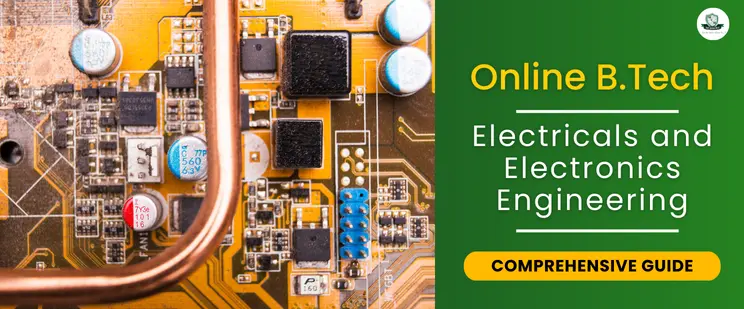The Bachelor of Technology (B.Tech) Electrical and Electronics Engineering (EEE) is a four-year undergraduate curriculum that covers both electrical systems and electronic devices. The course includes circuit theory, control systems, power electronics, microprocessors, digital and analog electronics, signal processing, and communication systems. Students acquire hands-on experience through lab work, internships, and projects, which promotes practical skills and inventiveness. The curriculum stresses the application of electrical and electronic concepts in order to create efficient and advanced technical solutions. Graduates are well-prepared for a variety of careers in industries such as power generation and distribution, telecommunications, consumer electronics, automation, and robots, where they can work as design engineers, system analysts, project managers, and R&D experts.
B.Tech Electrical and Electronics Engineering Course Details
| Degree | Bachelors |
| Full Form | Bachelor of Technology in Electrical and Electronics Engineering |
| Duration | 4 Years |
| Average Fees | Rs. 25,000 – Rs 2,50,000 per year |
| Average Salary | INR 3-10 LPA |
| Job Roles | Electrical Engineer, Power Systems Engineer, Electrical Design Engineer, Test Engineer, etc. |
Eligibility Criteria for B.Tech Electrical and Electronics Engineering
When it comes to pursuing a B.Tech in Electrical and Electronics Engineering, certain eligibility criteria must be met. Students aspiring to enroll in this program typically need to have completed their high school education with science stream. Additionally, most institutions require candidates to pass an entrance examination like JEE Main or other relevant engineering entrance tests. Along with academic qualifications, some colleges may have specific age limits for applicants.
Understanding the eligibility criteria is crucial for prospective students to ensure they meet the necessary requirements before applying for a B.Tech in Electrical and Electronics Engineering program.
How To Get Admission for B.Tech Electrical and Electronics Engineering?
To secure admission for B.Tech Electrical and Electronics Engineering, aspiring students need to follow a structured approach.
- Research top universities offering this program is essential. Look for institutions renowned for their engineering faculty and cutting-edge facilities in the field.
- Understanding the admission criteria is crucial. Universities often require a strong background in mathematics and physics, along with qualifying scores in entrance exams like JEE Main or other relevant tests.
- Highlighting any relevant extracurricular activities or projects related to electrical and electronics engineering can strengthen your application.
- Seeking letters of recommendation from teachers or professionals who can vouch for your academic capabilities and potential is advantageous.
- Staying updated on application deadlines and ensuring all necessary documents are submitted on time is key.
- Preparing for any interviews that form part of the admission process can significantly boost your chances of securing a seat in the B.Tech Electrical and Electronics Engineering program.
Popular Entrance Exams for B.Tech Electrical and Electronics Engineering
Below is a list of some of the entrance exams for B.Tech Electrical and Electronics Engineering:
| JEE Main | Conducted by NTA, this exam is the gateway for top engineering colleges in India. |
| JEE Advanced | For admission to prestigious IITs, this exam is the next step after clearing JEE Main. |
| BITSAT | The entrance exam for Birla Institute of Technology and Science (BITS), Pilani. |
| VITEEE | Vellore Institute of Technology Engineering Entrance Exam for VIT campuses. |
| SRMJEEE | SRM Joint Engineering Entrance Exam for SRM Institute of Science and Technology. |
| COMEDK | For engineering colleges in Karnataka, COMEDK UGET is a popular choice. |
| UPSEE | Uttar Pradesh State Entrance Exam for admission to colleges in Uttar Pradesh. |
| WBJEE | West Bengal Joint Entrance Examination for engineering institutes in West Bengal. |
| MHT CET | Maharashtra Common Entrance Test for engineering courses in Maharashtra. |
| KEAM | Kerala Engineering Architecture Medical entrance exam for colleges in Kerala. |
Top 10 B.Tech Electrical and Electronics Engineering Colleges in India
Here’s a list to help you make an informed decision:
| Indian Institute of Technology (IIT) Bombay | RV College of Engineering, Bangalore |
| Delhi Technological University (DTU) | Vellore Institute of Technology (VIT) |
| Birla Institute of Technology and Science (BITS), Pilani | SRM Institute of Science and Technology |
| National Institute of Technology (NIT), Trichy | PSG College of Technology, Coimbatore |
| Thapar Institute of Engineering and Technology | Manipal Institute of Technology |
Syllabus and Subjects for B.Tech Electrical and Electronics Engineering
The syllabus for B.Tech Electrical and Electronics Engineering is structured to provide students with a solid foundation in theoretical knowledge and practical skills. Here is the list of subjects students will study:
| Semester 1 | Semester 2 |
| Physics | Chemistry |
| Mathematics-I | Mathematics-II |
| Programming for Problem Solving | Basic Electrical Engineering |
| Engineering Graphics | English |
| Energy and Environmental Engineering | Engineering Workshop |
| Practical / Lab Work | Practical / Lab Work |
| Semester 3 | Semester 4 |
| Mathematics-III | Transform Techniques and Applications |
| Circuits Theory | Material Science |
| Analog Electronics | Digital Electronics |
| Electrical Machines-I | Electrical Machines-II |
| Electromagnetic Fields | Power Systems-I |
| Practical / Lab Work | Practical / Lab Work |
| Semester 5 | Semester 6 |
| Managerial Economics & Finance | Microprocessors & Microcontrollers |
| Power Systems-II | Power Electronics |
| Control Systems | Measurements & Instrumentation |
| Power System Analysis | Digital Control Systems / High Voltage Engineering / Electric & Hybrid Vehicles |
| Power Generation Systems / Digital Signal Processing / Computer Networks | Seminar |
| Practical / Lab Work | Practical / Lab Work |
| Semester 7 | Semester 8 |
| Power System Dynamics | Entrepreneurship and Project Management |
| Distribution System Automation | Electric Power Quality / Special Electrical Machines / Machine Learning and Deep Learning |
| Electrical Safety / Wind and Solar Electrical Systems / Solid State Drives | Embedded System Design / Operations Research / Nano Electronics |
| Communication Systems / VLSI Design / Artificial Neural Networks | Project |
| Practical / Lab Work | Practical / Lab Work |
Why Choose B.Tech Electrical and Electronics Engineering?
Here are 5 reasons why choosing this specialization can be a rewarding decision:
- Cutting-Edge Skills: B.TECH Electrical and Electronics Engineering equip you with cutting-edge skills in electrical systems, power generation, and electronics, essential for modern energy networks.
- Career Opportunities: Graduates in this field have a wide array of career opportunities in sectors such as renewable energy, telecommunications, power systems, and electronics manufacturing.
- Innovation and Sustainability: Through this program, you will contribute to innovation in sustainable energy solutions, playing a vital role in shaping the future of energy networks.
- Hands-On Experience: The curriculum includes hands-on experience with state-of-the-art equipment, preparing you for real-world challenges in the energy industry.
- Global Demand: With the increasing global demand for energy-efficient technologies, professionals with expertise in B.TECH Electrical and Electronics Engineering are highly sought after worldwide.
Salary of B.Tech Electrical and Electronics Engineer
The average salary range for B.Tech Electrical and Electronics Engineering graduates in India varies depending on factors such as experience, skills, and the organization they work for. Entry-level positions can offer salaries ranging from INR 3-6 lakhs per annum, while mid-level positions may range from INR 6-12 lakhs per annum. For those with specialized skills or working in top-tier companies, the salary range can go up to INR 12-20 lakhs per annum or even higher.
The demand for professionals in this field is steadily increasing with the growth of technology and innovation in the energy sector. Individuals specializing in power systems, renewable energy, or automation tend to command higher salaries due to the specialized knowledge and expertise required in these areas. Continuous upskilling and staying updated with the latest industry trends can also have a significant impact on salary increments and career growth opportunities for B.Tech Electrical and Electronics Engineering graduates in India.
Career Options After B.Tech Electrical and Electronics Engineering
Here are some career scopes for BTech Electrical and Electronics Engineering graduates:
| Job Roles | Description |
| Power Systems Engineer | Designing and maintaining power distribution systems. |
| Electronics Hardware Engineer | Designing and testing electronic components. |
| Control Systems Engineer | Developing automated systems for industries. |
| Renewable Energy Specialist | Working on sustainable energy solutions. |
| Embedded Systems Engineer | Creating embedded software for various devices. |
| Robotics Engineer | Designing and programming robots for different applications. |
| Data Analyst | Analyzing electrical data to improve systems efficiency. |
| Telecommunications Engineer | Managing communication networks. |
| Instrumentation Engineer | Developing control systems for various industries. |
| Research Scientist | Contributing to cutting-edge innovations in the field. |
Skills That Make You The Best Electrical and Electronics Engineer
Here are some of the skills required to become the best Electrical and Electronics engineer:
| Technical Proficiency | Team Collaboration |
| Problem-Solving Skills | Communication Skills |
| Analytical Thinking | Project Management |
| Innovative Mindset | Adaptability |
| Attention to Detail | Ethical Responsibility |
FAQs
What is the scope of B.Tech Electrical and Electronics Engineering?
B.Tech Electrical and Electronics Engineering offers a vast scope in various industries like power generation, telecommunications, automotive, and renewable energy sectors. Graduates can work as electrical engineers, control engineers, or electronics design engineers.
What are the key subjects covered in B.Tech Electrical and Electronics Engineering?
Key subjects include electrical circuits, power systems, digital electronics, control systems, and electromagnetic theory. These subjects provide a strong foundation for students to understand electrical and electronic systems.
Are there opportunities for research and innovation in this field?
Yes, B.Tech Electrical and Electronics Engineering opens doors to research and innovation in areas like renewable energy, smart grid technologies, and robotics. Students can explore cutting-edge developments and contribute to advancements in the field.
How can B.Tech Electrical and Electronics Engineering graduates contribute to society?
Graduates can contribute by designing sustainable energy solutions, developing efficient electronic devices, and improving automation processes. Their expertise plays a crucial role in shaping the future of energy networks and technology integration.



